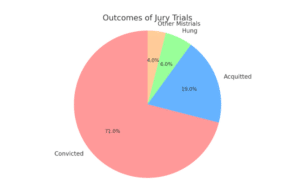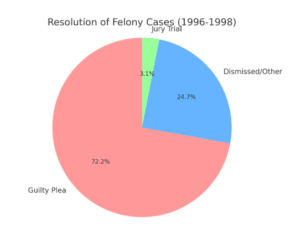
Jury trials are a cornerstone of the American legal system, symbolizing fairness and justice. However, when a jury is "hung" or "deadlocked," unable to reach a unanimous verdict, the result is a mistrial. This phenomenon not only disrupts the legal process but also raises questions about the effectiveness and efficiency of our judicial system. A recent comprehensive study by the National Center for State Courts (NCSC) sheds light on the frequency and causes of hung juries, offering valuable insights for legal professionals and the public.
Study Background
The NCSC's study, funded by the National Institute of Justice, examined jury trials across 32 counties in 14 states, including all federal circuit courts. Data was collected in two phases, focusing on felony trials from 1980 through 1997 and detailed case reviews from 1996 to 1998.
Between 1996 and 1998, approximately 1.2 million felony cases in 30 state courts were resolved in various ways. Around 70% ended in a guilty plea, 24% were dismissed or diverted to alternative programs, and less than 3% went to a jury trial. Of the 33,000 cases that were jury trials, 6% resulted in a hung jury. Overall, about three-quarters of trials, whether by bench or jury, ended in conviction.
This study is the first cross-jurisdictional examination of hung juries in nearly forty years.

Key Findings
- Frequency of Hung Juries
- On average, 6.2% of jury trials in state courts resulted in a hung jury.
- Federal courts had a lower rate, averaging 2.5%, with notable variations across jurisdictions.
- Factors Influencing Hung Juries
- Case Complexity: Trials with more complex evidence and legal instructions were more likely to end in a hung jury.
- Juror Dynamics: Early voting in deliberations and strong interpersonal conflicts among jurors increased the likelihood of a deadlock.
- Evidence Ambiguity: Cases with closely matched evidence often resulted in hung juries.
- Juror Perceptions and Behavior
- Jurors who hung were more likely to view the outcome as less fair and found the evidence and legal instructions more challenging.
- Jury diversity and individual juror attitudes towards police and the legal system also played roles, though racial diversity did not directly predict hung jury rates.
Implications for the Legal System
Hung juries pose significant challenges:
- Resource Strain: Mistrials require retrials, adding to the financial and logistical burdens on courts.
- Perception of Fairness: Frequent hung juries can undermine public confidence in the legal system’s ability to deliver justice.
Recommendations
To mitigate the impact of hung juries, the study suggests several strategies:
- Enhancing Juror Comprehension: Providing jurors with clear, plain-English instructions, allowing note-taking, and facilitating questions during trials.
- Improving Jury Deliberations: Offering guidance on effective deliberation methods, including conflict resolution and structured voting procedures.
- Evaluating Charging Decisions: Prosecutors should carefully consider the strength of evidence before proceeding to trial, especially in cases relying heavily on police testimony.
While hung juries are an inevitable part of the judicial process, understanding their causes and implementing targeted strategies can help reduce their frequency. These efforts ensure that deadlocks occur only in genuinely close cases, preserving the integrity of the jury system. For legal professionals like George Creal, staying informed about these findings is crucial for navigating the complexities of trial practice and advocating for improvements in the judicial process.
See the study for more information:
A Profile of Hung Juries. https://www.courtstatistics.org/__data/assets/pdf_file/0022/30559/A-Profile-of-Hung-Juries.pdf
Contact Us Today
For a free consultation, contact the Law Offices of George Creal today on the web at www.georgecreal.com or on the phone at (404) 333-0706. We are here to help you navigate the legal system and fight for your rights.
Disclaimer
The information in this blog post is for general informational purposes only and should not be construed as legal advice. Please consult with an attorney to discuss your specific legal situation.

